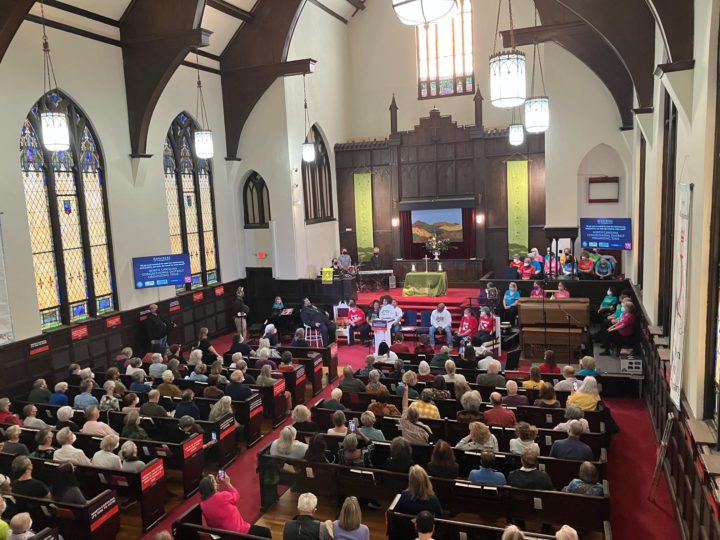Press release from Repairers of the Breach:
As part of a statewide organizing tour across North Carolina to turn poor and low-income people out to vote and mobilize a coalition of all races, Bishop William J. Barber II, president and senior lecturer of Repairers of the Breach, and impacted people made their final stops ahead of the midterms with rallies on Saturday in Asheville and Durham.
The Saturday rallies were part of the Mass Mobilization Organizing Tour across North Carolina’s Congressional Districts, with previous in-person stops in Greensboro, Wilmington, Wilson, Winston-Salem and Elizabeth City, and a digital event in Fayetteville.
“Voting is not just a matter of casting a vote on a candidate, it’s about demands on public policy,” said the Rev. Barber. “In these midterm elections, North Carolinians get to express their demands for living wages and health care without their voices being suppressed and stymied because of various forms of voter suppression that were attempted in North Carolina and overcome. We must exercise the right to vote that’s been so hard-fought for, not 50 years ago, but in recent history.”
The rallies on Saturday coincided with the first weekend of early voting in North Carolina. The tour also joined Unlock Our Vote NC in Raleigh for a GOTV event.
The tour concluded in Asheville to highlight the importance of building fusion movements among the poor and low wealth to fight for living wages, health care and more.
“Y’all need to vote because we can’t,” said 13-year-old Julia Darity to the crowd, eliciting a standing ovation.
“Telling the truth in a time of lies is revolutionary in and of itself,” the Rev. Barber said, applauding the speakers.
“Anyone who tries to undermine the right to vote is saying ‘you’re not a human being,’” the Rev. Barber said. “You don’t struggle for something and then once you get it, refuse to use it.”
North Carolina partners with Repairers of the Breach include Fight for $15, Beloved Community Center, The Justice Coalition, Forward Justice, the North Carolina Poor People’s Campaign, NC Second Chance Alliance and Transformative Justice Coalition.
About 3.4 million poor and low-income people in North Carolina are eligible to vote, with 2.2 million having made their voice heard in the 2020 presidential election. Poor and low-income people can change the political calculus of the nation, and it is imperative that every low propensity voter in North Carolina heads to the polls.
“The direction of the nation runs through North Carolina,” said the Rev Barber. “North Carolina has an opportunity to determine the makeup of the U.S. House of Representatives and Senate, and can show the nation how to fight against extremist state legislatures in the south and deliver basic human rights to the people.”
In North Carolina, 44% of people are poor or low-income—a total of 4.6 million residents. This includes 53% of children (1.2 million), 46% of women (2.3 million), 58% of Black people (1.2 million), 67% of Latinx people (699,000), and 36% of white people (2.2 million). In addition, 2 million North Carolina workers make less than $15 an hour — that’s almost 50% of the state’s workforce. And 1 million people are uninsured.
2022 also marks a milestone for voting rights in North Carolina: 55,000 previously disenfranchised individuals with prior felony convictions are now eligible to vote in November, marking “the largest expansion of voting rights in North Carolina since the Voting Rights Act of 1965.” This follows other recent major voting rights wins: earlier this year, North Carolina extremist legislators were blocked from using a gerrymandered map for the primaries, and in 2017 the NAACP North Carolina successfully blocked a discriminatory voter registration law (NAACP v McCory) that targeted Black voters with “almost surgical precision.”
“North Carolinians now get to have same day registration and early voting, something extremist politicians attempted to take away from them,” said the Rev. Barber. “They don’t have to have a voter ID because we now have attestation at the polls.They now have a chance to go in and elect persons that will do what the majority of North Carolina wants to see done anyway: provide health care and living wages and women’s rights.”
With the U.S. Supreme Court now reviewing North Carolina lawmakers’ ability to draw district maps, the future of voting rights remains unclear in North Carolina. The time is now for every North Carolinian to make their voice heard and for every poor and low-income individual to turn out to vote.




Before you comment
The comments section is here to provide a platform for civil dialogue on the issues we face together as a local community. Xpress is committed to offering this platform for all voices, but when the tone of the discussion gets nasty or strays off topic, we believe many people choose not to participate. Xpress editors are determined to moderate comments to ensure a constructive interchange is maintained. All comments judged not to be in keeping with the spirit of civil discourse will be removed and repeat violators will be banned. See here for our terms of service. Thank you for being part of this effort to promote respectful discussion.